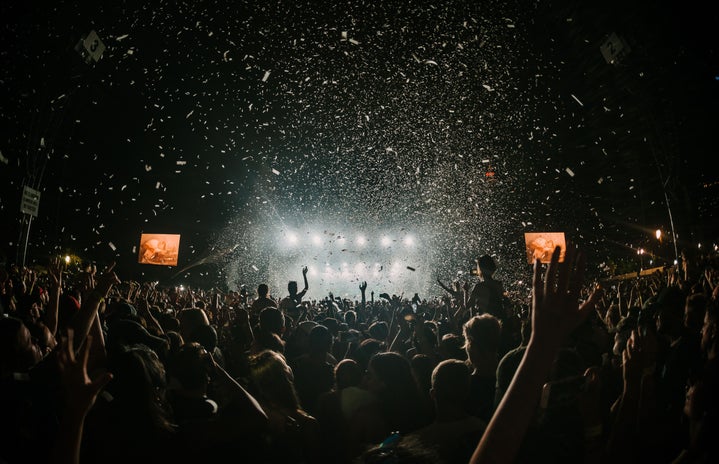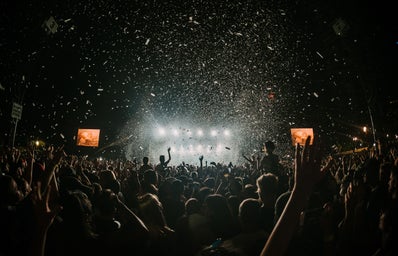Korean Pop, also known as KPOP, has become increasingly popular with frontrunners such as BTS and BLACKPINK. Now that this style of music is topping American charts and award shows, more and more people are dipping their toes into a whole new world of entertainment. As a seasoned veteran when it comes to KPOP, I love seeing the new fans and my favorite idols finally getting the recognition they deserve. However, the KPOP industry has been negatively affected by the United States market and its “all or nothing” approach to fame and popularity.
BACK TO THE BEGINNING: KPOP HISTORY 101
Before the 1980s, KPOP was frequently used to share words of activism to inspire the pro-democracy movement. When South Korea’s government made the transition to a centralized democratic republic, the industry was forced to evolve or die out. As a solution, the first multi-talent group debuted in the early 1990s, sparking a new era of music and economic income. The KPOP industry grew exponentially, bringing us to KPOP as we know it today. (You can check out this article by the Los Angeles Film School for more!)
KPOP Groups typically feature vocalists and rappers, all members enduring intense training in dance, music, and culture. To debut as a KPOP idol is a major accomplishment as people have sacrificed their childhoods, friends, and education to live their dreams. South Korea also has an oftentimes damaging culture of its own in regard to beauty and aesthetics. Idols are often criticized for their race and the natural differences between a pure South Korean or a mixed person, pushing them to whiten their skin and engage in unhealthy diets to maintain the valuable image of their companies.
Because of the immense pressure to succeed, talent-seeking companies are constantly analyzing trends both in South Korea and internationally.
KPOP emerged in the American music industry during 2006-2009 with idols SE7EN, BOA, and RAIN. In the following years, idols would find small tours and successes in the United States until 2012’s release of “Gangnam Style” by PSY. PSY made waves in western music charts, introducing a wide and new audience to the world of KPOP.
KCON, a global 3-day concert, was established to meet the world’s demands for more KPOP. The excitement around this new form of music continued to grow and grow, laying the foundation for groups like BTS, BLACKPINK, and MONSTA X to top American charts. (This article provides a comprehensive breakdown of KPOP in the United States!)
WHAT’S THE (CURRENT) DEAL WITH KPOP?
Our lovely K-idols continue to amass popularity in America, making appearances on talk shows and holding lengthy tours in the States. From an outward perspective, things seem pretty good for the industry. Talent companies are now able to promote in countries they never have before, idols are traveling the world! Americans seem to be supporting and loving KPOP, however, this is frequently a facade.
The majority of KPOP that now finds its way to the top of American music charts has been stripped of its individuality and entirely Americanized. (In this situation, “Americanized” is defined as the assimilation of “foreigners” into the American language and culture)
Now this is a very bold claim to make. Due to my long history with KPOP, I have been able to see the evolution of the industry. To my disappointment, it seems the only way Korean groups can find success in American music charts is to drastically rework everything that makes them Korean. We’re talking about the expectation for them to speak and sing in only English and continued whitewashing. I’ve also added my take on the perceived “crazy fan” culture surrounding KPOP artists.
IT’S NOT DISRESPECTFUL TO SPEAK A LANGUAGE OTHER THAN ENGLISH
There is a constant expectation for all non-white people in the States to be able to speak English. We often see this racism in red-carpet or talk-show interviews with KPOP groups. It should be common practice to provide translators for such occasions, yet many groups are denied this access. Many interviewers rely on the members who know some English to translate for their entire group, adding unnecessary pressure to the idols. It also makes for deeply uncomfortable and awkward conversations that lack any depth.
How are KPOP groups supposed to share their passion for music and the work they are accomplishing every day when they are restricted to speak in a language they aren’t fluent in? Idols are forced to adjust to a lot of these social pressures while Americans criticize the groups’ “intelligence”. Many people question KPOP artists for speaking and performing in broken English while the same Americans only know one language and somehow manage to fail their English and literature exams.
WHY DOES WHITEWASHING EXIST?
The “All-American” aesthetic has always featured a white person with blonde hair and blue eyes. Unfortunately, the United States is frequently racist and systematically favors the “All-Americans” over people of color.
South Korea already has a history of encouraging idols to whiten their skin. In the American industry, this is heightened with added levels of “desirable” physical features like double eyelids. It is not uncommon to watch KPOP interviews while in America where the idol’s foundation is three shades lighter than the skin on their chest. Many idols also feel pressured to undergo plastic surgery to create double eyelids or use cosmetic tools like tape to achieve that American look.
What is most disturbing about the physical changes forced on these groups is the marketability they have afterward. As idols look more and more like the “All-American”, more people can be introduced to the groups through the “oh wow they look American but a little bit spicy” pipeline. People see something they’re comfortable with like fair skin and eurocentric facial features but still feel like they’re being “progressive” because K- idols are Asian.
I’M gonna FIGHT EVERY AMERICAN INTERVIEWER THAT PAINTS KPOP STANS AS CRAZY (AND YOU SHOULD, TOO)
We’ve all heard it, especially when it comes to BTS, that their fans are super intense. “Super intense” is a kind phrase compared to some of the things American hosts have said. Along with the wild fan claims, a popular question is if idols have ever had a fling with someone from their fanbase. Ellen DeGeneres is a notable talk show host that made BTS so uncomfortable to the point where V, one of the members, had to stop any further addition by DeGeneres by repeatedly saying “no”.
Now, I am not saying that there are never any fans who are concerning or “crazy”. There is a large problem with “saesangs” (stalkers but creepier) in the KPOP industry. What I do have a problem with is the assumption that any KPOP fan is insane and over the top. I have no idea why the American music industry in particular hyper fixates on this lie (maybe it’s because none of their musicians have fans as passionate as KPOP stans). These claims simultaneously advertise KPOP artists while making openly liking and supporting them taboo or weird. America is telling you to enjoy this group while also giving you a weird look if you express any interest in them.
LET’S WRAP IT UP
I would like to note that I recognize the racism felt by all communities of color in the United States, and in no way are the experiences I’ve shared about KPOP idols only applicable to them. KPOP is a fantastic, beautiful, dynamic genre that celebrates a variety of achievements. The industry has its own internal problems, and in no way are these helped by its current americanization.
I encourage you all to explore the intricacies of KPOP and do your own research, get your own perspective and opinion about this industry. Some of my fondest memories revolve around groups that I listen to and the friends I made through the KPOP community.
BONUS RECS
Is it a Kass article without music recs? (No!)
- DEAN: this man is the type of guy to take you on a trip to France because you had a bad week. He creates the most chill R&B that goes so hard
- NCT: my ult group, love these fine gentleman, their range is insane and they have like 6 different units that make-up NCT so you’ve got a lot of options with them
- My current favorites are “Yestoday”, “Simon Says”, and “Chain Japanese Version”
- Hope World: BTS member Hobi’s (J-HOPE’s) personal album that makes you bounce that booty one minute then sob the next
- TWICE: a fantastic girl group with RANGE, put out the iconic “LIKEY”
- Red Velvet: another girl group but they all exude “we’re lesbians and maybe we poisoned our abusive boyfriends we were forced to date”
- HYUNA: solo female artist who got fired from her first company for dating the love of her life (THEY ARE NOW ENGAGED!!!!) but our savior PSY hired her and lets her put out absolute bangers
- The Rose: a band with incredible vocalists, they know how to make you cry over a relationship you never really healed from
- ASTRO: boy group with the sweetest guys ever, they’ve got some range but stay around the nostalgic summer 2016 vibe
- SEVENTEEN: a previous ult of mine that have incredible range and an entire unit dedicated to dance, they’ve all been training together since 2011-ish so their chemistry is unmatched


